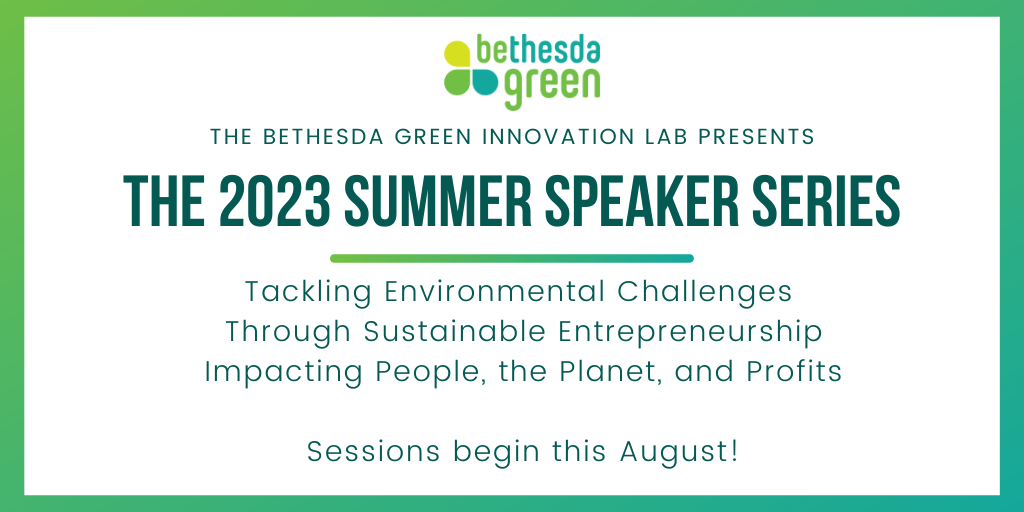Tackling Environmental Challenges Through Sustainable Entrepreneurship
Impacting People, the Planet, and Profits
At Bethesda Green’s Innovation Lab, we are constantly on the lookout for leaders who are building for-profit business models around innovative and sustainable solutions to tackle environmental and social challenges.
This summer, we are excited to once again welcome founders, industry experts, and policy makers to join us for exciting conversations designed to inspire, motivate, and educate all who attend.
Scroll down for additional information about each panel, including links to register, session summaries and recordings, and panelist bios. Missed past sessions? Check out information from our 2021 and 2022 speaker series, too!
Session #1 – How Do We Achieve “Responsible Fashion”? – Tuesday, August 14th, 3pm ET
“Responsible Fashion” aims to reduce the negative impact that the fashion industry has on the environment and society, by promoting sustainable practices and circularity. In this session, we’ll tackle fashion, an industry that is inherently unsustainable, and discover some of the local brands that have turned fashion into a climate friendly practice using sustainable materials and encouraging repair and reuse.
Panelists:
- Michelle Jaffe: Founder and Creative Director, Jolie Kai
- Joelle Firzli: Co-Founder and Managing Partner, Tribute Collective
- Rafiq Jennings: Fix-It DC Program Developer, DC Department of Energy & Environment (DOEE)
Session #2: The Role of Green Infrastructure in Sustainable Urbanization – Wednesday, August 16th, 3pm ET
With ⅔ of people expected to live in cities by 2050, what must businesses do to evolve and help their cities thrive sustainably? Green infrastructure, ranging from green roofs, vertical farming systems, and smart buildings, seem to be an answer to our urbanization issue. During this session we’ll discuss some of the innovations and technologies used to “green” our urban spaces, and some of the trends we can expect to see in the future.
Panelists:
- Brad Dockser: Founder and CEO, Green Generation
- Jörg Breuning: CEO, Green Roof Technologies
- Dave Tilley: Founder and CEO, Living Canopies
Session #3: Using Artificial Intelligence and Machine Learning for the Climate – Thursday, August 24th, 3pm ET
Emerging artificial intelligence and machine learning technologies are already changing the ways people work and interact, but what role could they play in our rapidly evolving fight against climate change? Explore how AI is used in mapping, modeling, and predicting changes in various natural ecosystems, as well as the potential challenges and considerations of using AI in the pursuit of sustainability.
Panelists
- Kumar Mainali – Senior Data Scientist and Data Science Lead, Chesapeake Conservancy
- Leslie Canavera – CEO and Managing Partner, PolArctic
- Jennifer Sleeman – Senior AI Researcher, Johns Hopkins University Applied Physics Laboratory
Speaker Bios

Jörg Breuning is one of a few people on earth who actively shaped the beginning of the modern green roof industry in Europe/Germany more than 4 decades ago and introduced green roofs to North America in 1999. He has over 40 years of experience in two fundamentally different markets: green roofs and green walls. Today, Jörg Breuning’s skills in biophilic design and sustainable engineering goes beyond green roofs and include specialties with living plants like: Green Walls, Green RailRoad Tracks, natural swimming pools, advanced composting technology, PV / Solar combinations with vegetation, plastic-free green roofs, and solutions for circular economy through urban mining – the highest level of sustainability and resilience.
 Leslie Canavera is the CEO and Managing Partner of PolArctic, an oceanography and data science company focused on solving business challenges in the Arctic. Leslie has a Master’s in Business Administration (MBA) with a concentration on International Business, and is a veteran of the US Air Force where she served as a commissioned officer. From the USAF, Leslie transitioned to the National Geospatial-Intelligence Agency (NGA) for five years conceptualizing and initializing programs with complex geospatial components and analytics. Leslie left NGA to found the technology start-up PolArctic LLC based on her experience and passion for the Arctic, and to bridge the gap between science and business requirements.As a Yup’ik, Alaska Native, Leslie maintains a deep understanding of her Arctic home through her work at PolArctic, and is able to develop the best AI/ML tools to provide insight of the dynamic environment. Leslie was awarded the Women in Artificial Intelligence (WAI) North America Award for AI for good: Environmental Social Governance (ESG) for 2022, and was listed as a 2021 Forbes Next 1000 entrepreneur.
Leslie Canavera is the CEO and Managing Partner of PolArctic, an oceanography and data science company focused on solving business challenges in the Arctic. Leslie has a Master’s in Business Administration (MBA) with a concentration on International Business, and is a veteran of the US Air Force where she served as a commissioned officer. From the USAF, Leslie transitioned to the National Geospatial-Intelligence Agency (NGA) for five years conceptualizing and initializing programs with complex geospatial components and analytics. Leslie left NGA to found the technology start-up PolArctic LLC based on her experience and passion for the Arctic, and to bridge the gap between science and business requirements.As a Yup’ik, Alaska Native, Leslie maintains a deep understanding of her Arctic home through her work at PolArctic, and is able to develop the best AI/ML tools to provide insight of the dynamic environment. Leslie was awarded the Women in Artificial Intelligence (WAI) North America Award for AI for good: Environmental Social Governance (ESG) for 2022, and was listed as a 2021 Forbes Next 1000 entrepreneur.

Brad Dockser is the Co-Founder and CEO of Green Generation, is a global energy solutions provider that engineers and implements energy efficiency solutions to lower buildings’ operating costs while improving sustainability. Previously, throughout two decades of real estate investing, Brad was a Principal with MacFarlane Partners and Founding Partner and Managing Director of Starwood Capital Europe and Starwood Capital Asia overseeing operations in each region. Brad received an A.B. cum laude in Economics and MBA from Harvard University.
 Joelle Firzli is the Co-Founder and Managing Partner at Tribute Collective. Joelle Firzli is a multicultural independent fashion scholar. Her main area of interest is the intersection between fashion and cultural sustainability with a focus on West Africa and the Mena. She publishes articles on a range of fashion related topics, including cultural identity and preservation, cultural legacy, and social and climate justice. Joelle is also a fashion entrepreneur and the co-founder of Tribute Collective, a responsible multidisciplinary organization focused on elevating visibility for global ethical fashion and design, and on community building through programmings such as exhibits, workshops, and discussions about the global fashion industry. Joelle holds a BA in Political Science from the Lebanese American University, and an MA in Fashion Studies from Parsons, The New School for Design.
Joelle Firzli is the Co-Founder and Managing Partner at Tribute Collective. Joelle Firzli is a multicultural independent fashion scholar. Her main area of interest is the intersection between fashion and cultural sustainability with a focus on West Africa and the Mena. She publishes articles on a range of fashion related topics, including cultural identity and preservation, cultural legacy, and social and climate justice. Joelle is also a fashion entrepreneur and the co-founder of Tribute Collective, a responsible multidisciplinary organization focused on elevating visibility for global ethical fashion and design, and on community building through programmings such as exhibits, workshops, and discussions about the global fashion industry. Joelle holds a BA in Political Science from the Lebanese American University, and an MA in Fashion Studies from Parsons, The New School for Design.

Michelle Jaffe is the CEO and Founder of Jolie Kai. Michelle’s mom was born and raised in Scandinavia and her European background influenced her fashion sensibility and her interest in quality fabrics, workmanship and unique designs throughout Michelle’s life. Jolie Kai, an online boutique featuring ethical and sustainable fashion, is a reflection of her mother’s sensibility and Michelle’s own personal values on sustainability. Michelle founded Jolie Kai with the belief that sustainable clothing can and should reflect our modern lifestyles, current trends, and make us look and feel great, while at the same time lightening the load that the fashion industry has on the environment and our health. Michelle has a BA in International Studies and a Master’s of Urban and Regional Planning, Land Use and Environment/Design.

Rafiq Jennings has over 7 years of experience with the DC Department of Energy and Environment, and is committed to developing a sustainable built environment for the District of Columbia. He excels at facilitating collaboration, assessing needs, creating options, and executing solutions. Rafiq created and developed the Fix-It DC program, which helps District residents reduce waste by learning to repair their broken household items, outside of his normal DOEE job duties. The Fix-It DC program is now a featured part of DOEE Zero Waste DC portfolio, with the program’s success included in the Sustainable DC 2.0 Progress Report, demonstrating the agency’s progress in achieving DC’s sustainability goals. Rafiq has a BA in Economics and a Master’s in Environmental Management.

Dr. Kumar Mainali is a Senior Data Scientist with a Ph.D. in ecology, evolution, and behavior, and an MS in statistics from The University of Texas at Austin. His research career spans diverse fields, including conservation biology, ecology, biogeography, climate change, human microbiome, behavior, and remote sensing. Kumar applies cutting-edge technology of machine learning and AI to predict complex problems, mathematical tools to solve fundamental questions in ecology and biogeography, and sophisticated statistical tools to understand processes, patterns, and mechanisms in ecology and earth systems. An AI system he co-developed accurately maps wetlands at high-resolution (1-m) using free data.Dr. Mainali has extensively worked on the models for mapping species distribution, both by applying and developing the methods. His research includes modeling over 700 species at local, national, and global levels, contributing to numerous publications in renowned scientific journals. Recently, he served as a guest editor for a special section of the Journal of Biogeography, focusing on emerging technologies, including machine learning.

Dr. Jennifer Sleeman is a Senior AI Researcher at the Johns Hopkins University Applied Physics Laboratory and also holds an appointment as a Research Assistant Professor in Computer Science at UMBC. Dr. Sleeman has been an AI researcher since the early 2000s. She defended her Ph.D. thesis, Dynamic Data Assimilation for Topic Modeling (DDATM) in 2017. Her Ph.D. thesis adapted the theory of data assimilation and applied it to a large, multi-sourced, scientific text collection. Her research in generative deep learning methods resulted in a recent patent. In 2020 and 2021, she published work related to deep learning models to identify planetary boundary layer heights using LIDAR-based backscatter profiles resulting in improved air quality reporting, and presented this work at IGARSS 2020 and SPIE 2021. Her latest work includes using deep learning for climate tipping point discovery to understand Atlantic Meridional Overturning Circulation (AMOC) Collapse funded by DARPA, a forecast-aware deep learning bias correction for air quality forecasting funded by NOAA and deep learning methods for Air Quality numerical model emulation funded by NASA and NOAA. She was the chair of the first AAAI 2023 Spring Symposium on AI Climate Tipping-Point Discovery and has recently been awarded by NOAA to study how AI could be used for wildfire sub-seasonal to seasonal forecasting.
 Dave Tilley is the co-founder and CEO of Living Canopies. As a green entrepreneur and professor of ecological engineering his professional mission is to develop eco-technologies that inspire peoples’ love of nature and makes the human-nature relationship more symbiotic. He invented the Living Umbrella technology based on an epiphany he had while suffering the extreme heat of a Las Vegas pool deck in 2015. Dave spreads the power of environmental entrepreneurship with every chance he gets. He developed a new college course, Ecological Innovation and Entrepreneurship, to encourage students interested in turning their ideas into impact. He is a National Science Foundation Innovation-Corps fellow and member of the University of Maryland’s Academy for Innovation and Entrepreneurship. Dave is focused on making Living Canopies a success. He oversees product development, marketing and sales, customer relations, and the finances.
Dave Tilley is the co-founder and CEO of Living Canopies. As a green entrepreneur and professor of ecological engineering his professional mission is to develop eco-technologies that inspire peoples’ love of nature and makes the human-nature relationship more symbiotic. He invented the Living Umbrella technology based on an epiphany he had while suffering the extreme heat of a Las Vegas pool deck in 2015. Dave spreads the power of environmental entrepreneurship with every chance he gets. He developed a new college course, Ecological Innovation and Entrepreneurship, to encourage students interested in turning their ideas into impact. He is a National Science Foundation Innovation-Corps fellow and member of the University of Maryland’s Academy for Innovation and Entrepreneurship. Dave is focused on making Living Canopies a success. He oversees product development, marketing and sales, customer relations, and the finances.
Thank you to our Sponsors!



